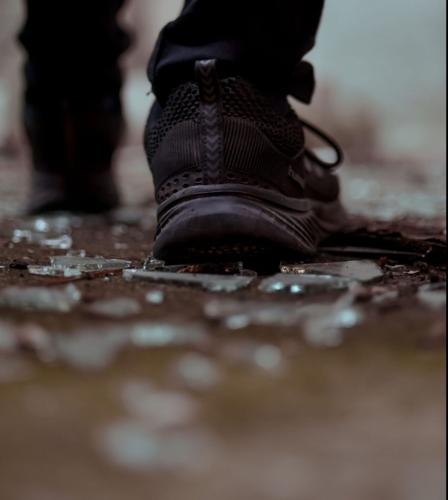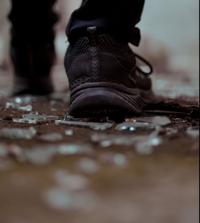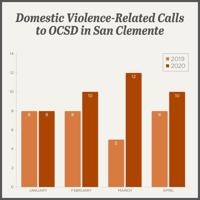By Lillian Boyd
Patricia Wenskunas has a message for survivors of domestic violence: You are not alone.
“Hang onto hope. There are people that care, and they can help you break the cycle,” Wenskunas said. “You can survive and thrive. Please reach out for help.”
Wenskunas is the CEO and founder of Crime Survivors Inc., a nonprofit organization that works to provide resources and assistance to victims of crimes, including murder attempts, rape and human trafficking. She says that with resource availability shifting, victims may have trouble reaching out.
When a survivor of domestic violence lives with his or her abuser, their safest hours could be during the workday, when they are apart.
Since California has enacted its stay-at-home order in March to reduce the spread of COVID-19, the hours that a survivor spends with an abuser have likely been extended. But monitoring domestic violence cases and responding to a victim’s outreach poses its challenges.
In Dana Point, domestic violence-related calls to Orange County Sheriff’s Department had decreased in March, compared to the same time last year, and had more than tripled in April, compared to the same time last year.
In San Clemente, OCSD received five domestic violence calls in March 2019 but received 12 calls in March 2020. April also saw a slight increase, from eight calls in April 2019 to 10 calls in April 2020. San Juan Capistrano has seen slight upticks each month of 2020 compared to the same months last year.
But not every survivor chooses to call law enforcement to report the abuse, whether that be due to fear of repercussions, fear of law enforcement or fear of their abuser getting in trouble. Those fears have been further complicated by the coronavirus pandemic.
“A lot of victims may be thinking, ‘If I stay home, I may be abused, but if I go to the hospital, I may die of COVID-19,’” Wenskunas said.
Wenskunas says that with resource availability shifting, victims may have trouble reaching out.
“Based on the calls we are getting, victims feel deterred when walk-in offices for police services are closed,” Wenskunas said. “Abusers tell victims things like ‘If you leave, come back and get us infected, I’m going to kill you.’ That kind of fear leads most victims to just want to keep their families together.”

Infographic: Chelsie Rex
Wenskunas says that Crime Survivors Inc., as well as other nonprofit organizations and agencies responding to domestic violence, have had to get creative in adapting to the circumstances.
“We need to listen to victims. Victims can tell us what they need; when we hear from them, we can create something better than what we were doing before,” Wenskunas said.
Crime Survivors Inc. has held weekly roundtable Zoom meetings for all Southern California counties. About 150-300 individuals representing service providers, various district attorney offices, sheriff’s departments, probation offices and advocacy groups join in on the call to better coordinate between agencies.
“We saw a spike in our hotline calls from the week of the stay-at- home order to the following week, by 40%,” said Andrea McCallister, Director of Development and Communications for Laura’s House, a domestic violence shelter in Orange County.
Nonprofits have been communicating with each other to help each other fill in the gaps for available hotel rooms, diapers, groceries and more. They’ve also assisted each other in adapting to social distancing.
McCallister says Laura’s House was quick to respond to the orders, knowing that victims of abuse would be relying on the organization. On March 18, Laura’s House counseling and therapeutic services were converted to a telehealth format, with clients meeting with therapists and legal advocates using a secure, online platform.
The emergency shelter was prepped and put into effect new policies and waiting periods for entering new clients, and the safety-net hotel night program ramped up, enabling coordinators to help those in urgent need by offering them bed nights with one of the local hotel partners.
From the week of March 16, when the stay-at-home order was issued, to the following week, Laura’s House saw a 40% increase in calls to its 24-hour Crisis Hotline. Coordinators also enabled the Heart Chat, (text and IM feature for teens) to be used for the general population, and provide another way for victims of abuse to reach out to them for help.
Orange County Sheriff Don Barnes, a Laura’s House Board Member, has reported that domestic violence-related calls to the Sheriff’s Department are up 20% over last year at this time.
By the end of the first four-week period of the stay-at-home order, domestic violence calls to the sheriff were up about 25% from a year earlier, according to Barnes’ statements during an April 16 county news briefing on COVID-19. He added that calls involving family disputes also were up about 24% during the same period, and that his department had taken eight calls for child abuse, compared with three during the same time period in 2019.
McCallister says that for those considering reaching out for help, the 24/7 hotline is the best way to start. Advocates who handle calls are able to coordinate resources and safety plans tailored to the individual’s circumstances and can figure out what will work out best for the survivor.
“The first 72 hours of when a victim leaves the abuser is the most dangerous,” McCallister said.
How to Seek Help
All hotlines operate 24/7.
Laura’s House: Call 866.498.1511 or text HEART to 949.484.8440. Visit laurashouse.org.
Human Options: Call 877.854.3594. Visit humanoptions.org.
Women’s Transitional Living Center: Call 877.531.5522. Email info@wtlc.org or visit wtlc.org.
National Domestic Violence Hotline: Call 800.799.7233. Visit thehotline.org.
Orange County Child Abuse Registry: Call 800.207.4464.
Orange County Adult Protective Services: Call 800.451.5155.
Laura’s House has since been able to reduce the waiting period for a safety net hotel stay. Temperature checks for staff and residents are part of new protocols to prevent the spread of COVID-19.
“We hope to work together to meet the needs of victims of abuse here in Orange County and our surrounding counties,” McCallister said. “We know that for many, it is a difficult time to reach out, but together we will be ready and positioned to help, inspiring hope and empowering change for a life free of abuse.”
For those who have not experienced domestic violence, Wenskunas asks allies to be patient, understanding and compassionate.
“The majority of survivors don’t want others who haven’t walked this journey to ever have to know what it feels like,” Wenskunas said. “Listen and hear what a victim says without judgment, without shame, without blame, without guilt. Try to to be in that moment with that victim so that there is hope and healing.”

Lillian Boyd
Lillian Boyd is the senior editor for Picket Fence Media and city editor for Dana Point Times. She graduated with a degree in journalism from Humboldt State University. Her work experience includes interviewing incarcerated individuals in the Los Angeles County jails, an internship at the Pentagon covering U.S. Army news as well as reporting and anchoring for a local news radio station in Virginia. Follow her on Twitter @Lillianmboyd and follow Dana Point Times at @danapointtimes.





